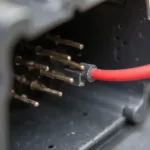Hemi MDS (Multi-Displacement System), a fuel-saving technology found in certain Chrysler, Dodge, and Ram vehicles with Hemi engines, can sometimes trigger OBD2 codes. Understanding these codes is crucial for maintaining optimal performance and fuel efficiency. This article provides a comprehensive guide to Hemi MDS OBD2 codes, their meanings, and potential solutions.
What is Hemi MDS and How Does it Relate to OBD2?
The Hemi MDS system allows the engine to deactivate half of its cylinders under light load conditions, such as highway cruising, to improve fuel economy. The OBD2 system (On-Board Diagnostics II) monitors various engine parameters, including those related to the MDS. When a malfunction occurs within the MDS system, the OBD2 system will store a diagnostic trouble code (DTC), which can be retrieved using an OBD2 scanner.
Common Hemi MDS OBD2 Codes
Several OBD2 codes are specifically related to the MDS system. Here are some of the most common ones:
- P3400: Indicates a general MDS malfunction.
- P3401 – P3408: These codes pinpoint specific cylinders experiencing MDS issues. For example, P3401 refers to cylinder 1, P3402 to cylinder 2, and so on.
- P3425 – P3432: These codes often indicate problems with the MDS solenoids, which control the oil flow that activates and deactivates the cylinders.
Diagnosing Hemi MDS OBD2 Codes
Diagnosing MDS-related codes requires a systematic approach.
- Check the oil: Low oil pressure or incorrect oil viscosity can interfere with MDS operation. Ensure the oil level is correct and the recommended oil type is being used.
- Inspect the wiring and connectors: Damaged wiring or loose connectors can cause communication problems between the MDS solenoids and the engine control module (ECM).
- Test the MDS solenoids: A multimeter can be used to test the resistance of the solenoids. Faulty solenoids will need to be replaced.
- Check the lifter roller: Worn or damaged lifter rollers can prevent the MDS from functioning correctly.
What Causes Hemi MDS Problems?
Several factors can contribute to Hemi MDS issues:
- Oil Sludge: Dirty oil can clog the MDS solenoids and restrict oil flow. Regular oil changes are crucial.
- Worn Lifters: Lifters play a critical role in the MDS operation. Over time, they can wear out, leading to malfunctions.
- Faulty Solenoids: The MDS solenoids are responsible for controlling the oil flow. They can fail due to electrical or mechanical issues.
- ECM Issues: In rare cases, the engine control module (ECM) itself can be the source of the problem.
Fixing Hemi MDS Issues
Depending on the specific problem, fixing Hemi MDS issues can range from simple maintenance tasks to more complex repairs.
- Oil Change: If oil sludge is suspected, an oil change with the correct oil type is the first step.
- Solenoid Replacement: Faulty solenoids need to be replaced. This is a relatively straightforward procedure.
- Lifter Replacement: Replacing worn lifters is a more involved repair that requires specialized tools and expertise.
Conclusion
Understanding Hemi MDS OBD2 codes is essential for maintaining the performance and fuel efficiency of your Hemi-equipped vehicle. By using an OBD2 scanner and following the diagnostic steps outlined in this article, you can identify and address MDS issues effectively. Regular maintenance and prompt attention to these codes can prevent more serious problems down the road.
FAQ
- What is the most common Hemi MDS OBD2 code? P3400 is often the first code to appear, indicating a general MDS malfunction.
- Can I drive with a Hemi MDS code? While you can usually still drive, it’s best to address the issue promptly to avoid potential damage and reduced fuel economy.
- How much does it cost to fix Hemi MDS problems? The cost varies depending on the specific issue. An oil change is relatively inexpensive, while lifter replacement can be more costly.
- How can I prevent Hemi MDS problems? Regular oil changes with the correct oil type are crucial for preventing MDS issues.
Need help with your Hemi MDS system? Contact us via WhatsApp: +1(641)206-8880, Email: [email protected] or visit us at 789 Elm Street, San Francisco, CA 94102, USA. Our 24/7 customer support team is ready to assist you.
